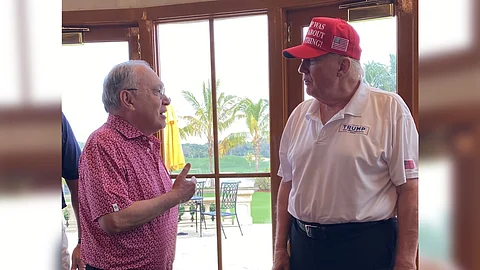
- NEWS
- the EDIT
- COMMENTARY
- BUSINESS
- LIFE
- SHOW
- ACTION
- GLOBAL GOALS
- SNAPS
- DYARYO TIRADA
- MORE

President Ferdinand Marcos Jr. will not attend the inauguration of United States President-elect Donald Trump on 20 January, according to Philippine Ambassador to the US Jose Manuel Romualdez.
“As a matter of policy, no head of state is invited. Only ambassadors based in Washington are invited,” Romualdez explained, confirming his own attendance. He clarified that US protocol dictates that no heads of state are invited to an inauguration ceremony.
Romualdez made the statement via a Viber message to GMA Online.
President Marcos had earlier called Trump to congratulate him on his victory in the 2024 US presidential elections, where Trump defeated US Vice President Kamala Harris.
During their phone conversation, Marcos emphasized the longstanding and strong relationship between the Philippines and the US, and both leaders discussed ways to further strengthen the alliance moving forward.
Trump also inquired about the health of Marcos’s mother, former First Lady Imelda Marcos, and sent her his regards.
In a statement on Tuesday, the Department of Foreign Affairs (DFA) emphasized the importance of the congratulatory call between President Marcos and President-elect Trump.
“The call, described by the President as very friendly and productive, highlighted the positive momentum and trajectory of our bilateral relations with the United States,” the DFA said.
The DFA also noted the significant contributions of Filipino-Americans in the US, especially in the recent elections.
“The United States remains an important ally, partner, and friend to the Philippines,” the DFA said. “We look forward to working with the Trump administration to ensure that Philippines-US relations continue to thrive, benefiting from the strong cooperation in security, defense, and economic partnerships, as well as broader engagement in other areas of mutual interest.”
One of Trump’s campaign promises was to deport an estimated 11 million undocumented immigrants in the US, aiming to expel around one million per year. The DFA noted that there are approximately 370,000 undocumented Filipino immigrants in the US, the majority residing on the West Coast.
Trump’s inauguration will be historic, marking his return to the White House after a dramatic loss to Joe Biden in the 2020 election.
Despite the controversy surrounding his previous term, Trump emerged victorious in the 2024 elections. His second term as US president will be officially inaugurated with a high-profile ceremony, where international diplomats will be the key guests.
Last month, however, CNN reported that Trump had extended personal invitations to a select group of world leaders, including some with whom the United States has had strained relations in recent years.
Chinese President Xi Jinping was one of the most high-profile recipients of an invitation, an unusual gesture considering the ongoing tension between the US and China on various geopolitical issues, including trade, security, and the status of Taiwan.
But sources indicated that a delegation of senior Chinese officials is expected to attend on behalf of Xi.
In addition to Xi, other foreign leaders with strong ties to Trump have also received invitations.
El Salvador President Nayib Bukele, known for his populist politics and strongman tactics, and Italy’s Prime Minister Giorgia Meloni, a prominent figure in the European far-right movement, have both confirmed their invitations.
Likewise, Argentina’s President Javier Milei, another figure aligned with Trump’s political ideology, was invited.
These invitations signal Trump’s willingness to engage with leaders whose policies and governance styles have often clashed with those of the US and its traditional allies.
Trump’s desire to create a global spectacle at his inauguration reflects his diplomatic strategy of reengaging with foreign leaders, including both allies and adversaries.
Trump has expressed his intention to broaden dialogue with countries like Russia and North Korea, noting his rapport with President Vladimir Putin and leader Kim Jong Un.
In a recent interview, Trump discussed his ongoing communications with Xi and other global leaders, signaling that the inauguration could serve as an important diplomatic opportunity for both the US and other countries.
While Trump has invited several heads of state, the outreach has been informal, with some invitations passed through back channels or delivered during phone conversations on unrelated matters.
Trump’s team has also sent out official written invitations, leaving it up to the leaders to decide whether or not they will attend the ceremony.
As inauguration day approaches, the guest list continues to evolve, with diplomatic circles eager to see which leaders will attend the highly anticipated event.
The US Secret Service and the Capitol Police will be tasked with securing the event, which will involve heightened security measures, especially as some heads of state may require additional protection.
In addition to foreign leaders, the inauguration is expected to attract a large number of international dignitaries, media representatives and thousands of guests.
The event is also likely to feature several high-profile discussions surrounding US foreign policy, trade agreements and ongoing global conflicts.
As world leaders consider their attendance, the Trump inauguration promises to be a defining moment for international diplomacy in 2025.
